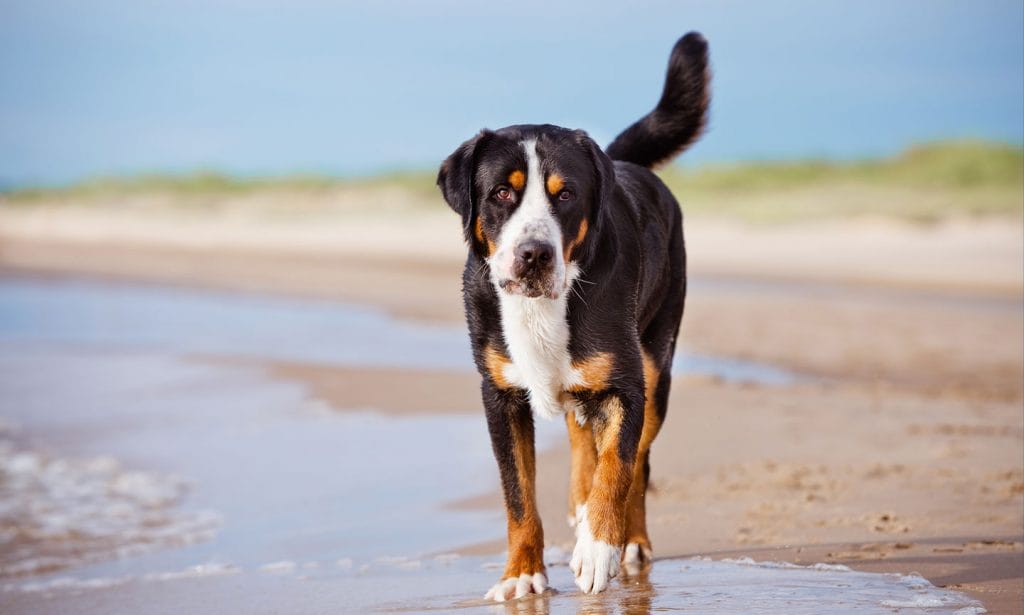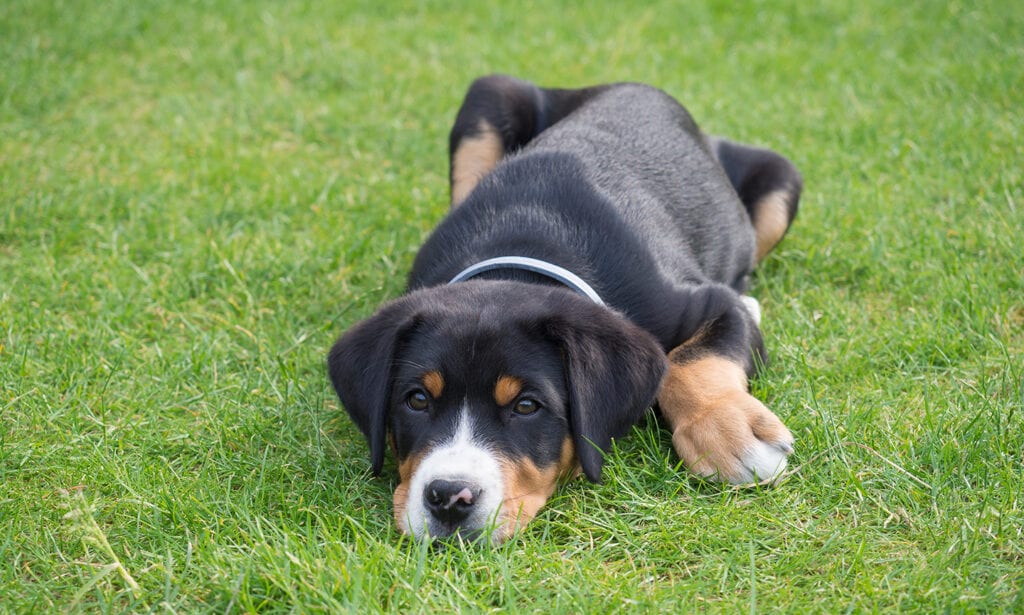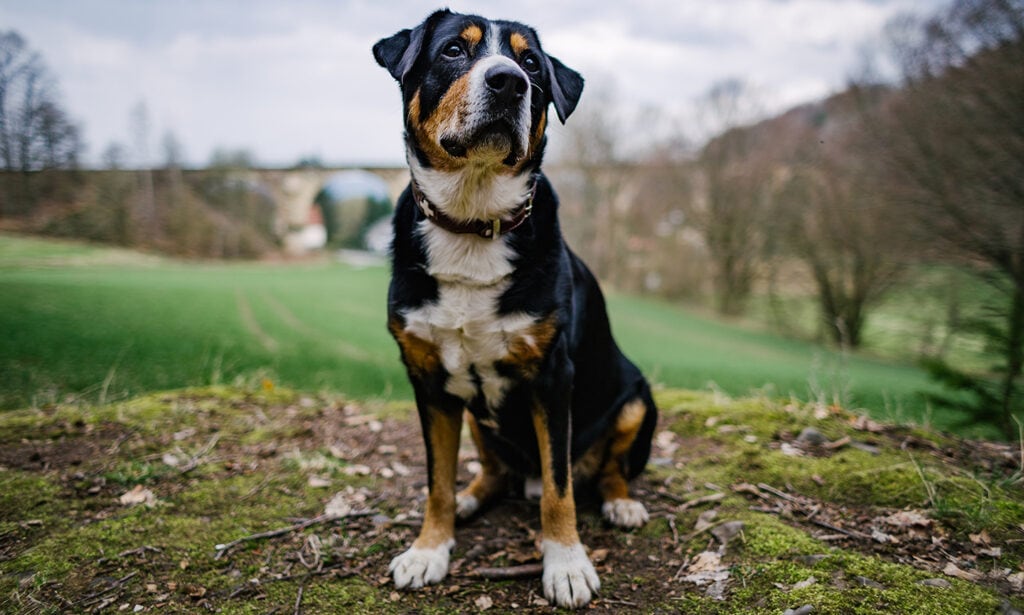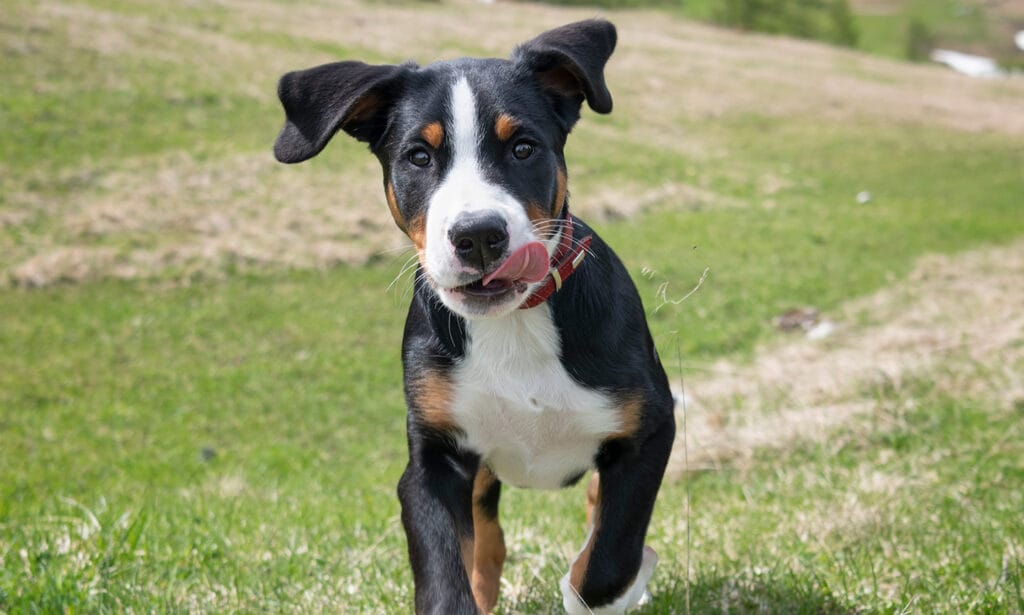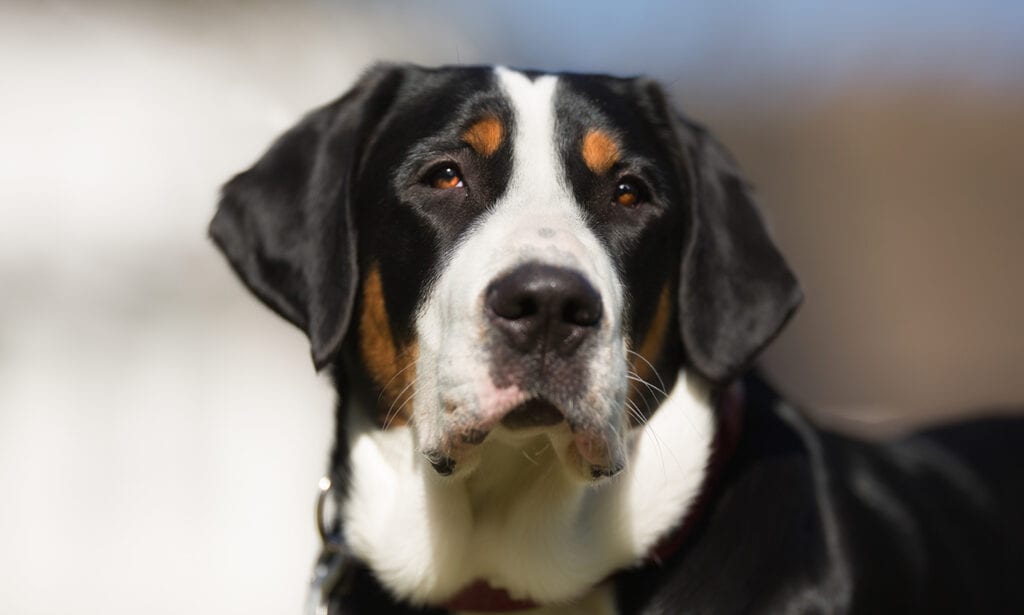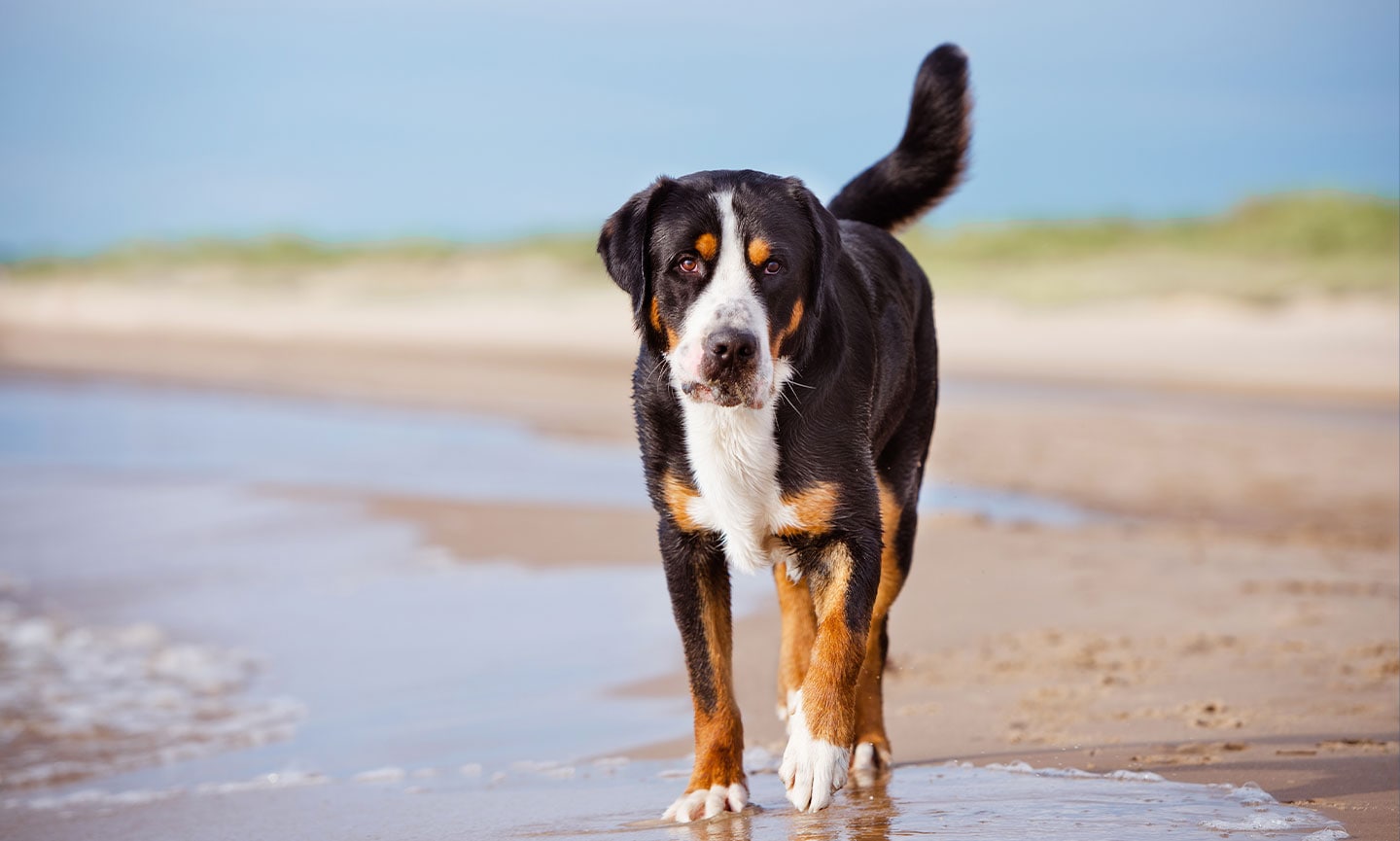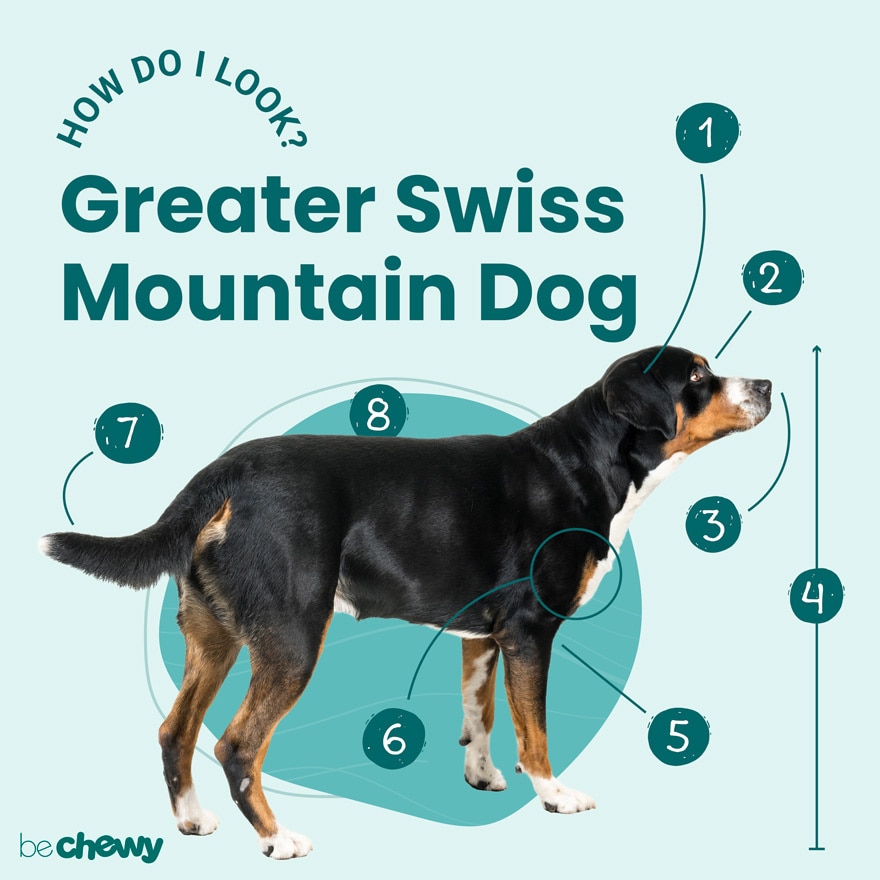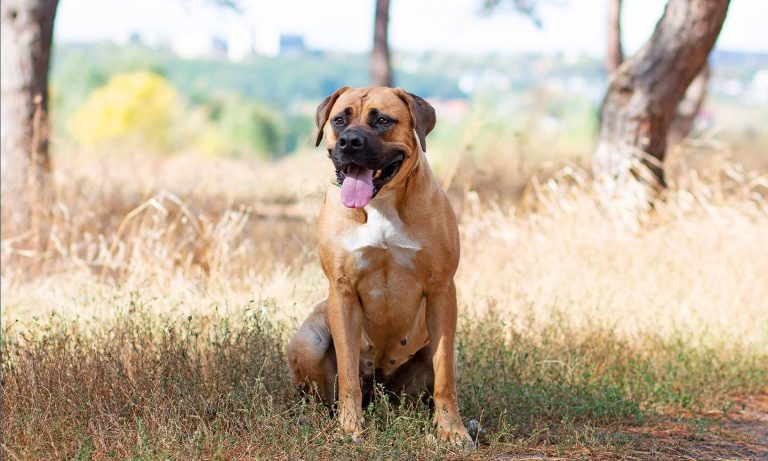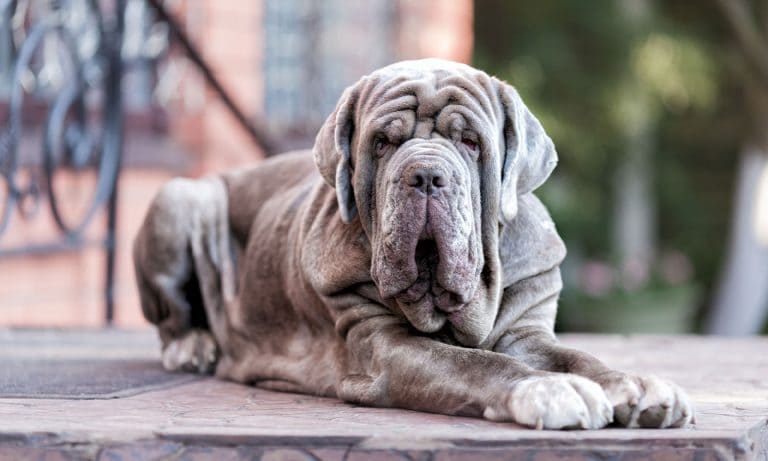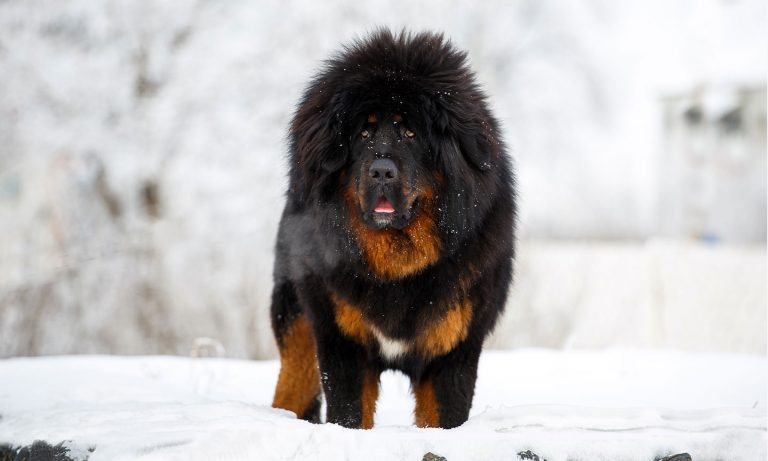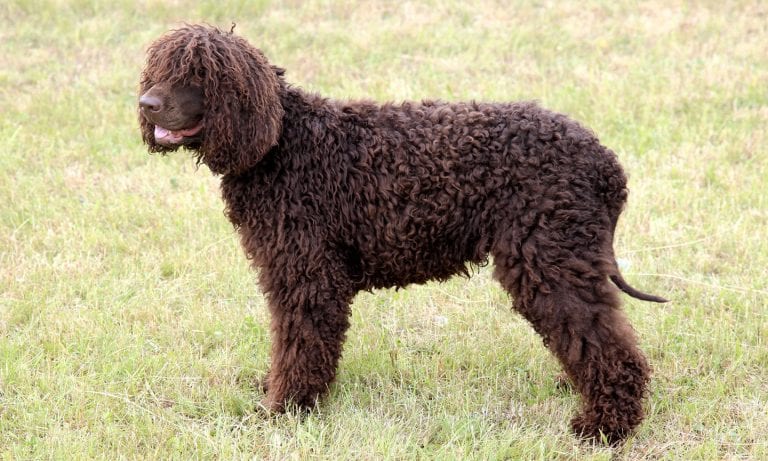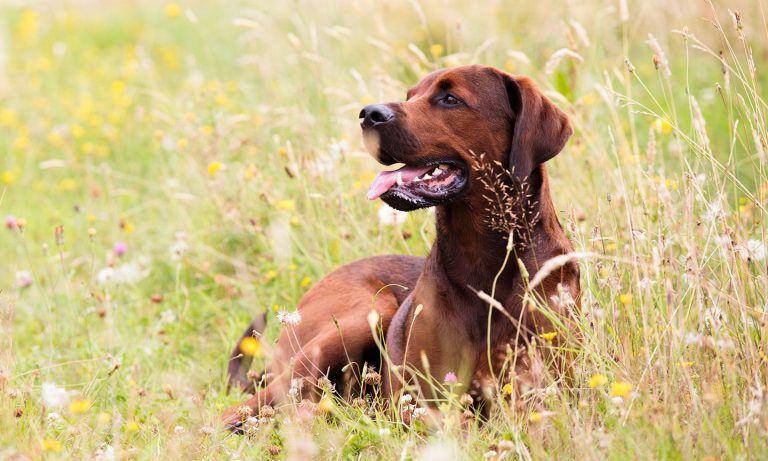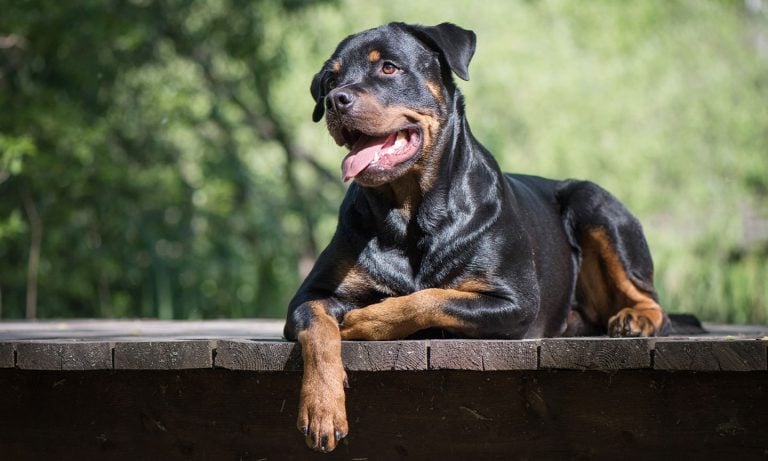If you love to explore the great outdoors, it makes sense to choose a pet with nature right there in their name. Enter the Greater Swiss Mountain Dog. This breed is confident, playful and independent with serious athletic ability—think of them as the star quarterback of the dog world. And Swissies are just as loyal as they are athletic, meaning they’ll prefer doing anything that involves you, their BFF. So lace up your hiking boots, because the day is going to be a great adventure.
Breed Snapshot
Temperament:
People-OrientedCheerfulLoyalCoat Color:
Black White And RedRed And WhiteBlue White And Tan
Best For
Loyal, athletic and playful, the Greater Swiss Mountain Dog thrives with experienced pet parents who love to spend their time outdoors and can provide plenty of exercise and playtime. A home with a big backyard is a plus for these outgoing and social gentle giants.
Greater Swiss Mountain Dog Temperament
You can think of Greater Swiss Mountain Dogs, with their large size and endearingly social personalities, as big, friendly giants. They generally love meeting new people and have outgoing personalities. That social tendency also means they don’t enjoy being left alone without their families for long and are very fond of snuggling.
One well-loved trait of this breed is their ability to bond strongly with their families. They particularly enjoy spending time with children, although parents need to be vigilant as Swissies can be very enthusiastic and forget their size when playing—possibly toppling younger children in the process! Proper training and socialization will help them learn self-control and manners around smaller or more fragile members of your family. It also greatly helps to teach children how to properly interact with dogs.
Greater Swiss Mountain Dogs can get along well with cats as long as they’re properly introduced. These dogs have an impressive herding drive and a complimentary prey drive, so teaching puppies how to properly interact with other pets is on the list of life lessons for your new friend.
They can have a slight stubborn streak (like most of us, let’s be honest), which means they need patient and calm parents to balance them out. You’ll need to be confident in your abilities in guiding the pup to channel the dog’s powerful playfulness in the right direction using positive training techniques. Translation: Reward their good behavior with praise, toys and of course, treats. (It’s really all about the treats.)
Greater Swiss Mountain Dogs are watchdogs but not guard dogs. They may sound the alarm with plenty of deep, throaty barking when a stranger approaches your home, but most strangers will be greeted with friendliness once they cross the threshold. These pups enjoy keeping an eye on the neighborhood and will tell you about anything out of the ordinary with a bark or two.
How to Care for a Greater Swiss Mountain Dog
Good news: Taking care of a Greater Swiss Mountain Dog doesn’t have to be a full-time job. Their coats are low-maintenance (though they do shed a bit), so you won’t be spending lots of time or money on grooming. Instead, plan to work in dedicated sessions each day for socializing, exercising and training these high-energy pups.
Greater Swiss Mountain Dog Health
Greater Swiss Mountain Dogs have a life expectancy of 8-11 years, and they suffer from fewer complaints than many other large-breed dogs. It’s a good idea to get familiar with the health problems that affect this breed, so you can work with your vet to keep your dog as healthy as possible. Always ask breeders for the results of your dog’s health tests, and if you’re adopting from a shelter, request a copy of the vet wellness exam.
- Orthopedic Problems: As with many large breeds, Swissies can suffer from hip and elbow dysplasia as well as osteochondritis (OCD). Dysplasia is caused when the joint isn’t formed properly, causing the dog pain. OCD is a condition that occurs when growing cartilage does not properly turn into bone. This results in an abnormally thick cartilage layer that may tear, resulting in inflammation and discomfort. Limping can be a symptom of dysplasia and OCD. Dysplasia may be treated with weight management, medications, physical therapy or surgery. OCD may be treated through exercise restriction or surgery, depending on the severity.
- Gastrointestinal Issues: As with many deep-chested breeds, gastric torsion (Gastric Dilatation-Volvulus) can be an issue for the Swissy. Symptoms include a swollen abdomen, non-productive retching, drooling, restlessness and abdominal pain. You can help prevent this condition by feeding your dog smaller meals throughout the day with a slow feeding bowl and avoiding strenuous exercise for an hour before and after meals. Splenic torsion can occur when the blood supply to the spleen twists on itself. Symptoms include severe abdominal pain, vomiting and severe weight loss. Both conditions are life-threatening and need immediate veterinary intervention.
- Urinary Incontinence: When it comes to potty troubles, the inability to “hold it” can affect puppies as well as spayed adult females. Medications are often used to treat the condition.
- Eye Problems: Swissies can suffer from slow-growing cataracts, distichiasis and entropion. Distichiasis involves extra eyelashes growing in the incorrect position, often scratching the eye and may be treated with medicated eye drops or surgery. Entropion is when the eyelid folds inwards and can be treated with surgery. Both can cause pain, corneal irritation and damage.
- Epilepsy: This disorder causes seizures. The cause is unknown, but many experts believe that it may be inherited. Seizures typically show up between 1-5 years old. Depending on the severity, symptoms are usually managed with medication.
Greater Swiss Mountain Dog History
The exact origin of the Greater Swiss Mountain Dog is unclear, but they’re believed to be descendants of the war dogs used by Roman Legions during their invasion of the Alps. Swissies belong to a group of dogs known as “Sennenhunds,” and in their native Switzerland are known as Grosser Schweizer Sennenhund or Grand Bouvier Suisse. The other breeds within the Sennenhund group include the Bernese Mountain Dog, the Appenzeller, and the Entlebucher Mountain Dog.
Up to the early 1800s, the Swissy was used by Alpine dairy farmers who found it cheaper to train dogs to pull carts instead of horses. This breed worked hard as draft dogs and hauled carts filled with dairy and meat to local markets. Swissies were also used as a general farm dog, watched over cattle and were good-natured and loyal family companions.
By the late 1800s, automation and mechanization meant the breed wasn’t needed for work, and their population decreased dramatically. In an attempt to preserve the breed, the Swiss Kennel Club recognized the dog in 1910. The first dogs were brought to the US in 1968, and the American Kennel Club (AKC) recognized the Greater Swiss Mountain Dog in 1995, and they’re a member of the Working group (the dogs bred with a job to do).
If you’re looking for the best place to find Swissy puppies, the AKC keeps a list of reputable breeders, as does the Greater Swiss Mountain Dog Club of America. A Greater Swiss Mountain Dog puppy costs 1,500-$3,000. For that price, you’re likely getting a pup who’s been screened for health and temperament issues and may come with pedigree papers. You can also adopt a Swissy, either from a rescue organization that focuses specifically on this breed, like the Greater Swiss Mountain Dog Rescue Foundation, or from your local animal shelter. Or, search Chewy’s database of adoptable dogs in your area.
FAQs
Do Greater Swiss Mountain Dogs shed?
Swiss Mountain Dogs shed heavily twice a year, when they blow their undercoat. At those times, you’ll need to use a deshedding tool every day to help keep shedding under control. For the rest of the year, the breed is pretty low-maintenance when it comes to their grooming needs.
Do Greater Swiss Mountain Dogs drool?
Greater Swiss Mountain Dogs are not known for drooling. Swissies are a dry-mouthed breed, so they naturally drool very little. They may drool a small amount while they’re waiting for you to serve up their yummy dinner, but they’re certainly not a slobbery type of dog!
Are Greater Swiss Mountain Dogs good pets?
Greater Swiss Mountain Dogs make great pets! The loyal and sociable temperament of the Swissy makes them a great choice. They’re enthusiastic and energetic with a good sense of adventure, so they suit active and experienced pet parents and are gentle with children. In their exuberance, they have been known to accidentally knock over small kids, so be sure to supervise playtimes with babies and toddlers. It’s also a good idea to teach children how to interact with dogs.
How long do Greater Swiss Mountain Dogs live?
Greater Swiss Mountain Dogs can live 8-11 years. With proper care, nutrition, exercise and regular vet visits, you can help your Swissy live a long and happy life.
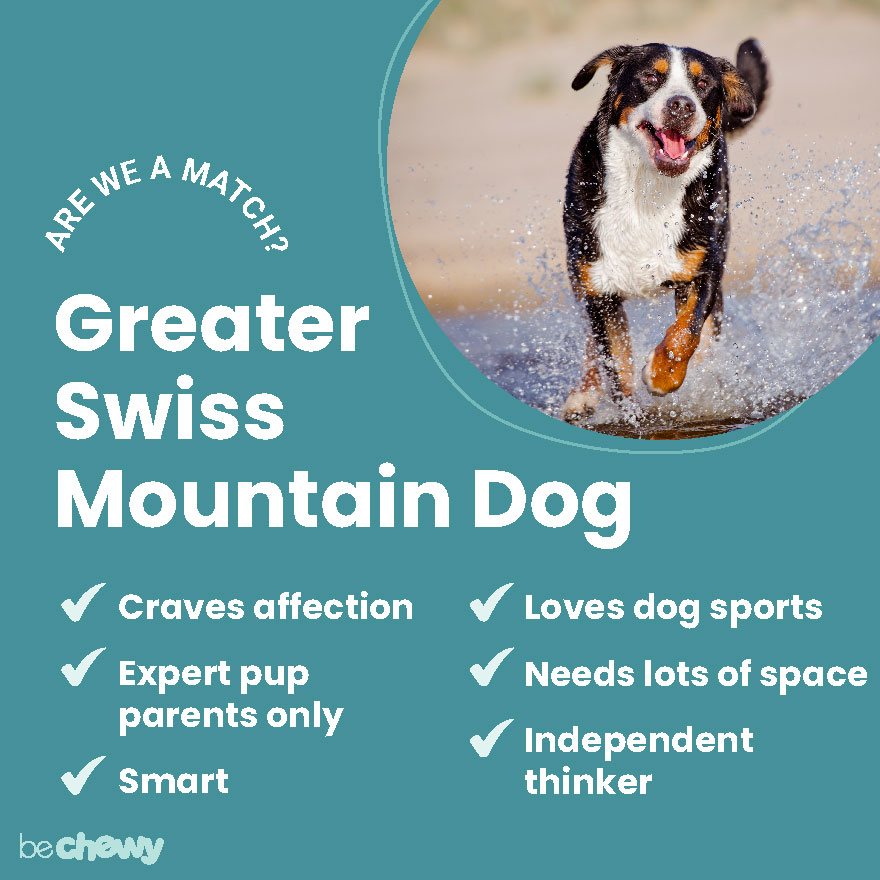
Top Takeaways
Greater Swiss Mountain Dogs are affectionate and enthusiastic pups who adore nothing more than hanging out with their families. Their strong work ethic means they love to be kept busy, whether that’s watching over their households or learning a new skill like cart pulling or obedience. Once you’ve opened your home and heart to a Swissy, you’ll wonder how you ever lived without one of these charismatic and bold pups.
Expert input provided by Dr. Jay Rowan, VMD, co-owner of the AAHA-accredited Paoli Vetcare; Dr. Mariea Ross-Estrada, DVM, Assistant Clinical Professor of Small Animal Primary Care at North Carolina State University; and certified dog trainer Jenna Slutzky, KPA, CTP, from Sabra Dog Training.
Breed characteristic ratings provided by Dr. Sarah J. Wooten, DVM, CVJ, a veterinarian at Sheep Draw Veterinary Hospital in Greeley, Colorado; dog trainer and behavior consultant Irith Bloom, CPDT-KSA, CBCC-KA, CDBC, owner of The Sophisticated Dog, LLC, in Los Angeles; and certified animal behavior consultant Amy Shojai, CABC, in Sherman, Texas.
The health content was medically reviewed by Chewy vets.

Search for Adoptable Greater Swiss Mountain Dogs Near You
Top Greater Swiss Mountain Dog Names
These are the top Greater Swiss Mountain Dog names as chosen by Chewy's pet parents!
Female Names
- Luna
- Heidi
- Issa
- Lucy
- Piper
- Winnie
- Nellie
- Roxy
- Fiona
- Bella
Male Names
- Moose
- Blaze
- Boone
- Archie
- Bentley
- Atlas
- Duke
- Hank
- Cash
- Zeus
Share:
